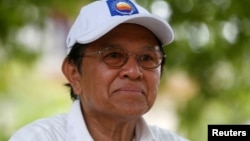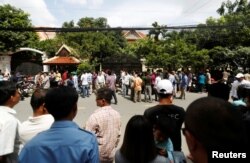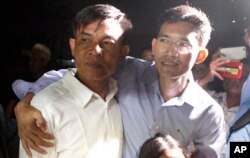Former Cambodian opposition leader Kem Sokha, who faces controversial treason charges, has been released on bail due to poor health and following an international outcry, but will remain under house arrest.
Kem Sokha is the highest-profile of almost two dozen activists, journalists and academics jailed in the lead-up to the July election, most of whom have either been released on bail or pardoned in recent weeks after the ruling party won every seat in the National Assembly.
Outside of his residence in Phnom Penh Monday, Kem Sokha’s lawyer Meng Sopheary said the former Cambodia National Rescue Party (CNRP) leader’s release came with court imposed obligations - which will severely restrict his movement and who he can meet with.
“He can not come out to meet you, but he would like to thank all of you for coming here to support him,” she told reporters.
Late last month, Kem Sokha’s bail appeal was rejected by the Supreme Court shortly before the Phnom Penh municipal court decided to extend his pretrial detention to 18 months during a closed hearing in jail.
The same judge that passed down that extension though had a change of heart on Monday, ruling that Kem Sokha’s high blood pressure and rheumatoid arthritis did indeed necessitate medical attention.
Judge Ky Rithy’s judicial review though forbids Kem Sokha from meeting "former CNRP leaders and individuals who may be involved in the case,” and “foreigners, especially foreigners who may be involved in the case.”
It also appears to confine him to his house and a permitter of triangulated connecting roads stretching across several blocks from the immediate vicinity of his home.
Sophal Ear, an associate professor of diplomacy and world affairs at Occidental College in Los Angeles, noted in an email that Kem Sokha’s release came after authorities had made “all manners of arguments that this couldn't possibly be done.”
“I guess the lesson is that Kem Sokha's continued arbitrary detention was of no benefit and his release was of no loss to the authorities, so they let him out,” he wrote to VOA.
In September of last year, Kem Sokha was jailed on treason charges for allegedly conspiring to overthrow the government through a U.S.-backed “color revolution” before his party was dissolved on the same grounds in November.
His arrest came in the midst of a widespread crackdown on the opposition, civil society and the media that saw dozens of critics brought before the courts, mostly on charges of incitement, treason and espionage.
Four land rights activists and 15 opposition Cambodia National Rescue party members have been pardoned in recent weeks while two Radio Free Asia journalists were granted bail.
ASEAN Parliamentarians for Human Rights Chairman and Malaysian MP Charles Santiago said in a statement that Kem Sokha’s sudden release in the early hours of the morning after multiple bail denials pointed to the political nature of the charges against him.
“His release, only after Prime Minister Hun Sen has shored up control of the parliament and country through a fake election, portrays a government seeking to legitimize the illegitimate,” the statement said.
Cambodian People’s Party spokesman Sok Eysan said via Telegram on Monday that the decision to release Kem Sokha was purely judicial.
“Therefore, the release or not of the charged person is up to the full discretion of the court, without interference from any outside party,” he said.
Last Wednesday, members of Prime Minister Hun Sen’s Cambodian People’s Party were sworn into parliament following the July 29 election, officially extending the premier’s more than 33-year rule.
The U.S., The EU and Australia, which all expressed grave concerns about the election, abstained from the inaugural session, which saw the CPP sworn into all 125 National Assembly seats.
Representatives from China, Malaysia, Timor-Leste and the United Nations Development Programme all attended, according to Reuters.
In the absence of western approval for his country’s criticized elections, Hun Sen has looked to China, Russia and other countries for support and political legitimacy.
Australian filmmaker James Ricketson remains in jail, serving a six-year sentence he was handed at the end of August for espionage despite the prosecution’s failure to even identify which country he was supposed to have been spying for.
His family has requested Cambodian King Norodom Sihamoni grant the 69-year-old a pardon instead of immediately appealing the decision.









